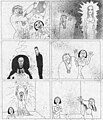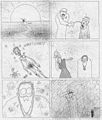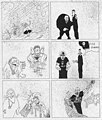King Lear by William Shakespeare
From WikiEducator
| Sections in this topic: | ||
|---|---|---|
| Introduction | Audiobook | Shakespearean Glossary | Context | Plot | External Links |  |
| Character and Characterisation | Dramatis Personae | Characterisation | |
| Important events | Topic | |
| Close Reading | Topic | |
| Important ideas | Overview | Topic | |
| Revision | Extension Activities | |
"A tragedy is a story of exceptional calamity leading to the death of a man in high estate" A.C. BRADLEY. | ||
To develop an understanding the key areas of the play, including:
|
| Before studying Shakespeare, it's important to know a few things about:
|
| Description: | King Lear unit |
| Subject: | |
| Topic: | |
| Type: | |
| Sector: | |
| Complexity: | Intermediate |
| Creator/Reviewer: | |
| Date: | 02/03/2012 |
| License: | |
| Contributors: | See: History |
| Tags/Keywords: | |
wiki
en
Audiobook of the complete play
Cartoon version of the play
Shakespearean glossary
Do you know your 'dost' from your 'wherefore'? There is a glossary of words commonly used in Shakespearean plays [here]. Make sure you know these words, as they'll help you to understand the play a lot better.
Context
Plot
Summary
Review
- Pull together across the whole text
- eg:
Act I Quiz
Quotations
Why are each of these quotations important in the play? Think about what they reveal about character, their importance in terms of theme, imagery, relationships etc. Make a comment about each one.
| Quotation | Importance: |
|---|---|
| ? |
Animal Imagery
Why is each of these animal allusions used?
| Quotation | Importance: |
|---|---|
| "that she may feel/How sharper than a serpent's tooth it is To have a thankless child." (Lear, I, iv, 294-96) [p. 70] |
? |
| "When she shall hear this of thee, with her nails She'll flay thy wolvish visage." (Lear, I, iv, 314-315) [p. 71] |
? |
| "Such smiling rogues as these, Like rats, oft bite the holy cords atwain Which are too intrince t'unloose; smooth every passion That in the natures of their lords rebel, Being oil to fire, snow to the colder moods; Renege, affirm, and turn their halcyon beaks With every gale and vary of their masters, Knowing naught, like dogs, but following." (Kent, II, ii, 75-82) [p. 84] |
? |
| "O Regan, she hath tied Sharp-toothed unkindness, like a vulture, here." (Lear, II, iv, 133-34) [p. 95] |
? |
| "She hath abated me of half my train, Looked black upon me, struck me with her tongue, Most serpentlike, upon the very heart." (Lear, II.iv.158-160) [p. 96] |
? |
| "Because I would not see thy cruel nails Pluck out his poor old eyes; nor thy fierce sister In his anointed flesh rash boarish fangs." (Gloucester, III.vii.57-59) [p. 128] |
? |
| "I' th' last night's storm I such a fellow saw, Which made me think a man a worm." (Gloucester, IV, i, 32-33) [p. 132] |
? |
| "Tigers, not daughters, what have you performed?" (Albany, IV.ii.40) [p. 137] | ? |
| "They flattered me like a dog, and told me I had white hairs in my beard ere the black ones were there." (Lear, IV, vi, 97-99) [p. 150] | ? |
| "Edmund, I arrest thee On capital treason; and in thy attaint This gilded serpent." (Albany, V, iii, 83-85) [p. 171] |
? |




